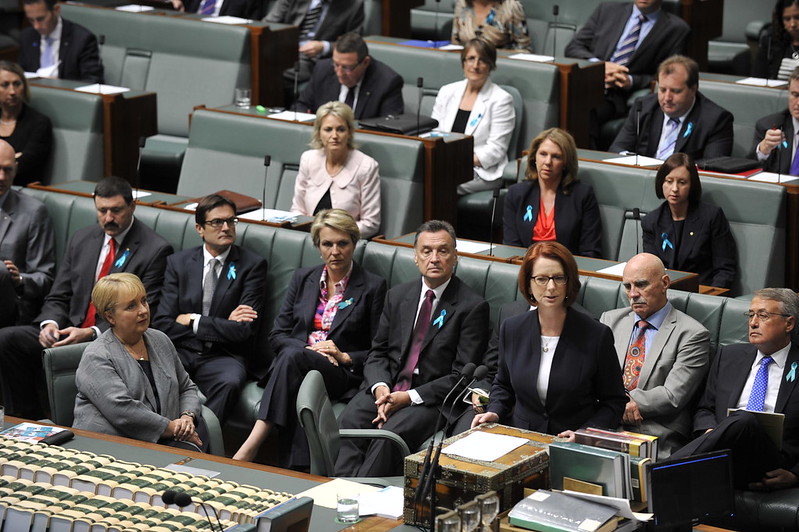
The Prime Minister has failed to put her National Security Strategy to Parliament. The document hasn’t even been tabled in the House. The Strategy is a public statement of policy, certainly, but the complete bypassing of the Parliament shows how far Presidential Pretensions and the Minder Mentality in the ministerial wing have skewed the workings of the Canberra system.
To be clear, the Gillard Government didn’t just fail to bring on any Parliamentary debate about what’s proclaimed as a central definition and driver of its international policy; the government didn’t even give the Strategy to Parliament. I’ll return to that larger failure to debate in a moment: the initial surprise this column is emphasising is the ignorance and arrogance of ignoring Parliament. Whether by blunder or design, the Gillard Government didn’t perform the simplest of actions, the formal presentation of the National Security Strategy by tabling it in the House of Representatives. This is the omission of a government that has problems with process.
Taking the Prime Minister’s own ambitions for the Strategy as a guide, the oversight is strange. Here is how the PM’s Department website describes the importance of ‘Australia’s first National Security National Security Strategy’, launched by Julia Gillard in a speech at the Australian National University on 23 January:
Strong and Secure: A Strategy for Australia’s National Security marks a new national security era in which the dramatic shift of economic and strategic weight to Asia dominates our national security outlook over this decade. The Strategy provides the overarching framework to guide Australia’s national security efforts over the next five years.
As a statement of ‘overarching framework’ the Strategy itself (PDF) is undeniably a significant document. We’re in new territory when such an announcement of strategy and policy doesn’t reach the Parliament. Indeed, Labor is breaking with its own precedent. On 4 December 2008, Prime Minister Kevin Rudd delivered what the PM’s Department used to headline as ‘The First National Security Statement to the Australian Parliament’. The text has now disappeared from the website of the PM’s National Security and International Policy Group, but if you go to the House of Representative’s Hansard for that day you’ll find Rudd’s statement and also a reply from the Opposition Leader, Malcolm Turnbull.
It was that equal-time-for-the-Opposition custom that seems to provoke so much resistance in the Minder Mentality. The Mentality and the Pretension to play presidential go a long way to explain why the first National Security Statement was delivered in the House while the first National Security Strategy becomes an exclusive creature of the executive.
After I checked with both the House and Senate Tables Offices and found that the Strategy didn’t exist as a Parliamentary paper, I put a question to the PM’s Media Office: why has this strategy document not been presented or tabled in Parliament?
A spokesperson for the PM replied:
The Prime Minister launched the National Security Strategy on 23 January 2013, ahead of the resumption of Parliament on 5 February 2013. The Strategy is published on the PM&C website (http://www.dpmc.gov.au/national_security/national-security-strategy.cfm) and is available for public scrutiny. The Strategy has been the subject of parliamentary scrutiny, including during Senate Additional Estimates hearings in February 2013.
The Senate Estimates process is one of the major Parliamentary innovations of recent decades and is hugely useful. But on this reading, Parliamentary scrutiny of Australian international policy is best served by Senators in committee questioning senior public servants. It’s an interesting view of how the Canberra system reviews national security.
By not even tabling the Strategy in Parliament, the Government is taking a troubling pattern to a natural conclusion. After following the habit of every preceding PM in presenting a major security statement to the House in 2008, Rudd fell prey to Presidential Pretension and the Minder Mentality when he launched the 2009 Defence White Paper on a Navy ship in Sydney Harbour. What should have been the PM’s tabling statement that day was delivered to the TV cameras and assembled sailors rather than to MPs.
Gillard followed that Rudd innovation by releasing her Asia Century White Paper last year not on the floor of Parliament but at the Lowy Institute in Sydney. So it was that the National Security Strategy was released at the ANU’s National Security College; the difference in the pattern is that at least the 2009 Defence White Paper and the Asia Century White Paper did eventually get tabled in Parliament. But the de facto tabling statements were made when the documents were released to the public, not when they became papers of the Parliament.
Tomorrow I’ll have a look at the impending release of the new Defence White Paper and how it might follow this now established pattern—and what could usefully be done to re-establish Parliamentary oversight.
Graeme Dobell is the ASPI journalism fellow. Image courtesy of Flickr user Julia Gillard.

